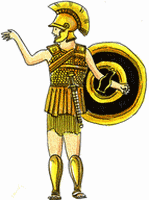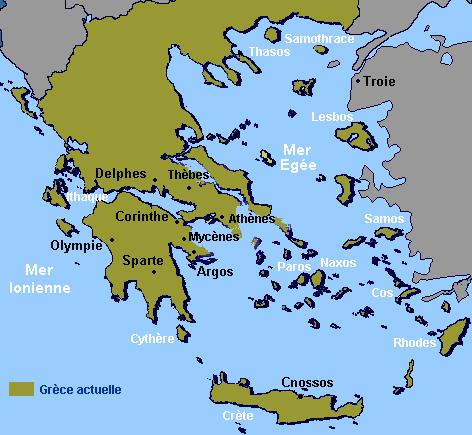Maps of the Antique
Mediterranean Sea
 Greece Greece
 Overview Overview
 Some dates Some dates
 Archaeological sites Archaeological sites
 Museums Museums
 Coinage Coinage
 Language and Writing Language and Writing
 Attic Attic
 Corinth Corinth
 Magna Graecia Magna Graecia
 Apulia Apulia
 Daunia Daunia
 Gnathia Gnathia
 Campania Campania

|
GREECE

|
Speaking about Greek antiquity implies to approach a complex world, which for the common people is reduced to the image of the Athenian "century of Pericles", with some drifts about the hellenistic time for some of the most famous statues. Which common points can however be found between the mycenian palaces and the roman colonies while during all the timespan concerned, Greece never existed as a nation? Even when the external threats were obvious, the greek cities seldom presented an united front.
How to approach such a cultural and regional diversity ? Most historians whose writings reached us were Athenians, and that brings also a deformation to our image. A first reference mark is provided by the Greeks themselves, who said that " is Greek the one who speaks greek" : that of the language.
|
Others may be found in the common mythology, or the relative peace that the Olympic Truce brought. But even thus, there is still a " before", an "after" and an "elsewhere ", about which we can give here only a very approximate outline.
Prehistoric Greece
Although the traces of settlements go back to oldest prehistory and include the presence of neandertalians, of paleolithic sites and neolithic eras, the greek tradition starts with the memory of the successive migrations of Ionian, Achaeans and Dorians.
The Bronze Age, Minoans and Mycenians
Already here, it is necessary to distinguish between the antique Minoan civilization which vestiges will be found in Crete and on Santorini, and the mycenian civilization which came to supplant it. The Mycenians are the Achaens whose accomplishments are told by Homer, between the 16th and the 12th century B.C. The follows a period called the dark centuries, about which little is known.
"Antique" Greece
As from the 9th century B.C. appear the cities, which will become city-states. After the Dorian invasion starts strictly speaking the Greek antiquity (archaïc, then classical period which corresponds more or less to the Athenian democracy). Within a few centuries, the greek population will pass from 700000 to 8 or 10 million people who establish colonies arount all the Mediterranean and even the Black Sea. After the defeat of 404 in the Peloponnesian War, however, Athens enter in a phase of decline. The Macedonian occupation defines, after Alexandre’s death in 323 B.C., the hellenistic period.
The roman domination covers then a period going approximately from 146 B.C. until the proclamation of Byzance as the second capital of the roman empire in 330 A.D.
Then will follow Byzantine Greece, medieval Greece and Ottoman Greece, until the independence war of 1821… As a democratic nation, Greece is almost a new country!
|
|

















